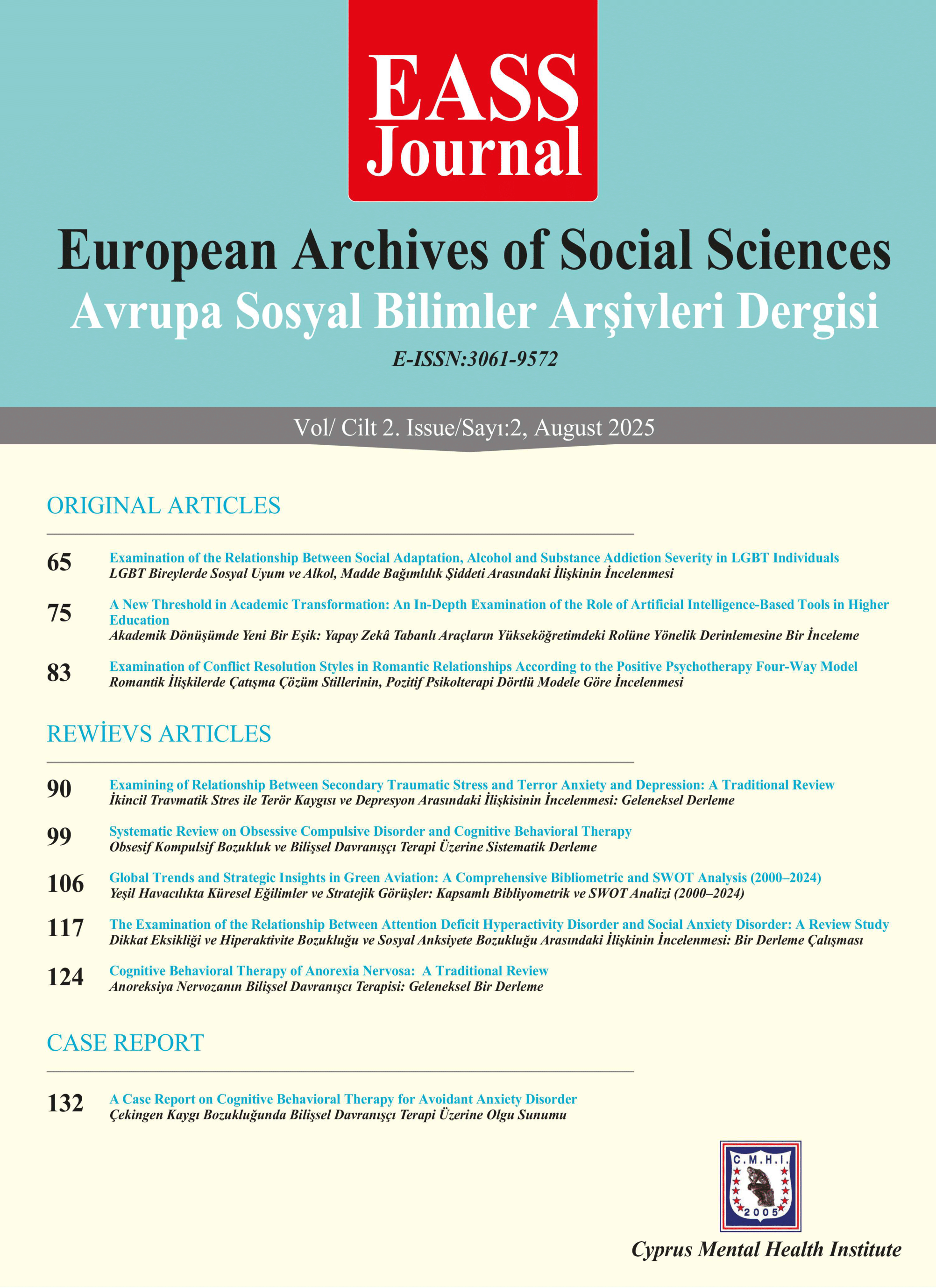Examination of Conflict Resolution Styles in Romantic Relationships According to the Positive Psychotherapy Four-Way Model
DOI:
https://doi.org/10.35365/eass.25.02.03Keywords:
Conflict Resolution Style, Positive Psychotherapy, Four-Way model, Conflict, Conflict in MarriageAbstract
This research aims to provide a scientific study on how people in romantic relationships or who are married cope with conflict and which aspect comes to the fore according to positive psychotherapy concepts. A total of 160 volunteer participants, 48 men and 112 women, who were randomly selected from the cities of Istanbul, Izmir and Ankara in Turkey, were studied. People in a romantic relationship exhibit behaviors most in line with the positive conflict resolution style in their relationships. They then exhibit submission and avoidance behaviors, respectively. The least used conflict resolution is the negative behavioral style.When the correlations in the four-way model (I, you, we, real us) with the participants' conflict resolution styles are examined, a positive and significant relationship was found between negative conflict resolution styles and the I-father relationship, the togetherness of the parents and the parent-other relationship. On the other hand, the relationship between the mother-father togetherness and the relationship of the mother-father with others and the submissive conflict resolution style is negative and significant. According to this result, people with good mother-father togetherness and symbiosis use a less submissive conflict resolution style. In addition, when the data on male and female differences, age and education, and economic levels were analyzed, no significant difference was found in conflict resolution styles. Scientific research to be conducted in the fields of conflict and positive psychotherapy will provide objective data according to sociocultural differences by conducting it in Turkey or other countries. In addition to the Four-Way Model in Positive Psychotherapy, primary and secondary abilities can be analyzed with the balance model and conflict resolution styles and their effects can be examined.
References
Aynur Mert, S. Ç., & Altunsu Sönmez, Ö. (2025). Evli Çiftlerde Evlilik Uyumuna, Evlilik Çatışması ve Çatışma Çözüm Stillerinin Etkisi. Journal of Academic Social Science Studies, 18(103).
Demirbağ, T., & Sarı, T. (2023). Pozitif Psikoterapi Yaklaşımına Dayalı Bir Olgu Sunumu: Kendi Kendine Yardım. Klinik Ve Ruh Sağlığı Psikolojik Danışmanlığı Dergisi, 3(1), 1-18.
Ersoy, D. (2024). Çatişma çözüm Tepki̇leri̇ ile Evli̇li̇k doyumu arasindaki̇ İli̇şki̇de duygu düzenleme güçlüğünün Düzenleyi̇ci̇ rolü (Order No. 31825038). Available from ProQuest Dissertations & Theses Global. (3161889164). Retrieved from https://www.proquest.com/dissertations-theses/çatişma-çözüm-tepki̇leri̇-i̇le-evli̇li̇k-doyumu/docview/3161889164/se-2
Eryılmaz, A. (2016), Depresyon Tanısı Alan Ve Almayan Genç Yetı̇şkı̇n Erkeklerı̇n Pozı̇tı̇f Psı̇koterapı̇ Yapıları Açısından Karşılaştırılması, Akademı̇k Bakış Dergı̇sı̇ Sayı: 53 Ocak - Şubat 2016 Uluslararası Hakemli Sosyal Bilimler E-Dergisi
Gettioğlu, G. (2023). Evlilikte çatışma çözüm stilleri benzerlik ve farklılıklarının bireyin psikolojik sağlığı üzerine etkisi.
Güney, Z., & Demirli, C. (2021). Uzun Süredir Evli Olan Bireylerin Çatişma Çözüm Stilleri ile Empatik Eğilimleri Arasindaki İlişkinin İncelenmesi. Akademik Platform Eğitim ve Değişim Dergisi, 4(2), 245-265.
Lancaster, T. (2025). How to Face Conflict in Marriage and Emerge as a Stronger Couple. Family Perspectives, 7(1), 3
Öner, D.Ş. (2013) “Evli Bireylerin Evlilik Çatışması, Çatışma Çözüm Stilleri ve Evlilik Uyumlarının İncelenmesi” İzmir , Dokuz Eylül Ünı̇versı̇tesı̇ Eğı̇tı̇m Bı̇lı̇mlerı̇ Enstı̇tüsü Aı̇le Eğı̇tı̇mı̇ Ve Danışmanlığı Anabı̇lı̇m Dalı, Aı̇le Eğı̇tı̇mı̇ Ve Danışmanlığı Programı Yüksek Lı̇sans Tezı̇
Peseschkian, N. (2015), Pozitif Psikoterapiye giriş, Anı Yayıncılık, Ankara,
Peseschkian, N. (2000). Positive Psychotherapy. New Delhi: Sterling Publishers.
Peseschkian, N. (1980). Positive family therapy. NY, Springer.
Peseschkian, N.(2005).Pozitif Aile Terapisi, Beyaz Yayıncılık, İstanbul
Sarı, T. (2015). Pozitif psikoterapi: Gelişimi, temel ilk eve yöntemleri ve Türk kültürüne uygulanabilirliği. The Journal of Happiness & Well-Being, 3(2), 182-203.
Şendil, G., & Korkut, Y. (2008). Evli çiftlerdeki çift uyumu ve evlilik çatişmasinin demografik özellikler açisindan incelenmesi. Studies in Psychology, 28, 15-34.
Ünal, S. (2022) Pozitif Psikoterapi Dörtlü Model, Eğitim Bilimleri Alanında Uluslararası Araştırmalar 1,sayfa(36), Eğitim Yayınevi, 2022
Ünal, Ö., & Akgün, S. (2022). Evlilikte çatışma çözme stillerinin evlilik uyumu ve doyumu ile ilişkisi. Psikiyatride Güncel Yaklaşımlar, 14(3), 322-330.
Downloads
Published
How to Cite
Issue
Section
License
Copyright (c) 2025 Günay Ünsal Gülseven, Aytül Türer

This work is licensed under a Creative Commons Attribution 4.0 International License.









 The journal is licensed under a
The journal is licensed under a 